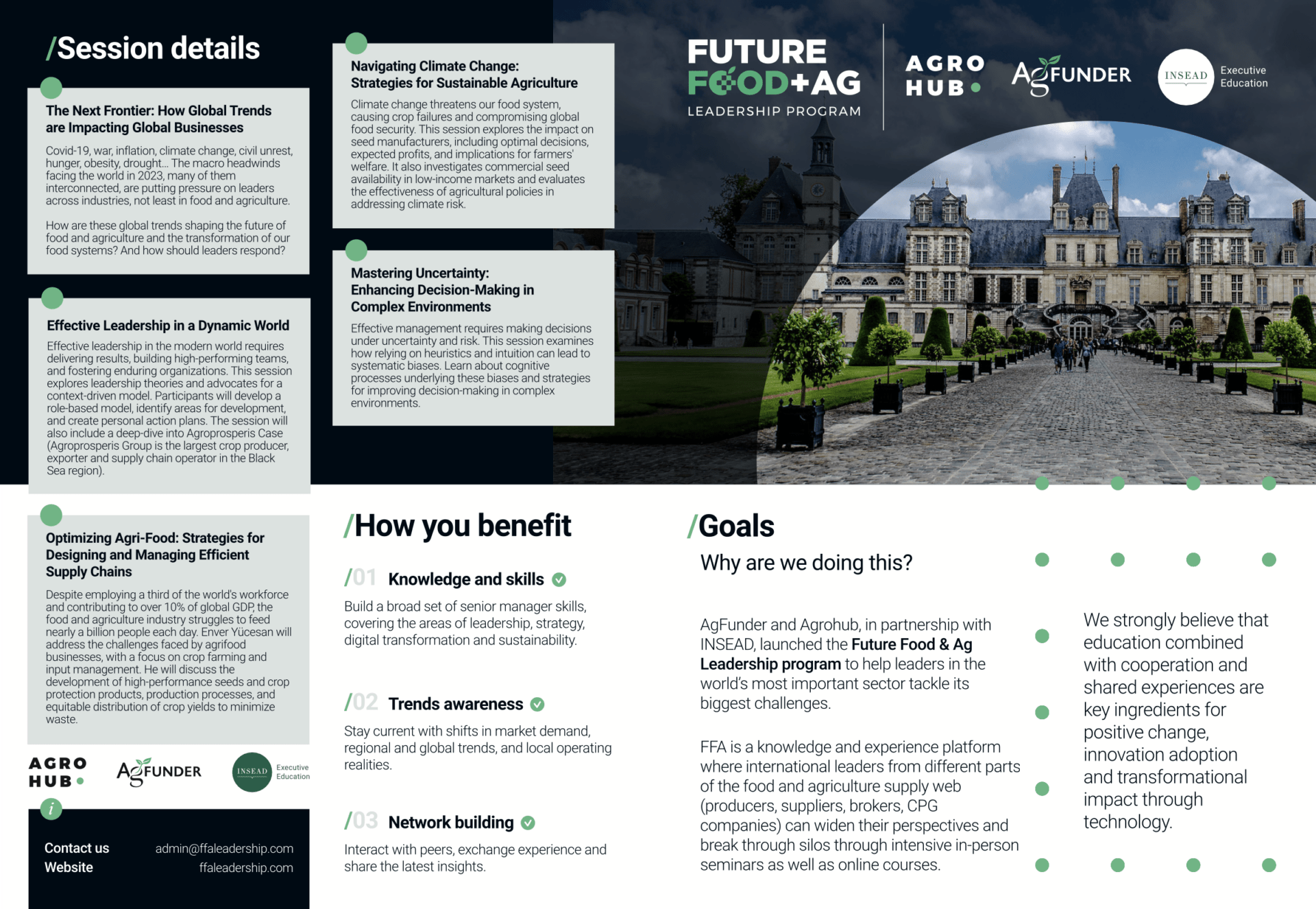Running a business is demanding at the best of times.
Throw in the unprecedented challenges facing the world today– from inflation to climate change, social unrest to labor shortages, war, and drought – and business leaders are being pulled in all directions.
In many cases, leaders are being asked to transform their businesses to meet today’s challenges and those of the future. Against this backdrop, effective leadership needs to encompass more than just delivering superior results, building high-performing teams, and ensuring enduring organizations; they also need to ensure their ESG policies are more than just an annual sustainability report, and that their employees feel valued and motivated – and less likely to burn out or quit.
In a very traditional industry like food and agriculture, adapting to 21st-century trends is no small ask, particularly as ethical questions around worker rights and the environmental impact of the sector loom ever larger.
Introducing the Future Food & Ag Leadership Program
To try and help agrifood executive leaders navigate the complex future ahead, AgFunder and data-sharing platform Agrohub have partnered with INSEAD, one of the world’s leading business schools, to create the Future Food & Ag Leadership Program (FFA).
A three-day, in-person business and strategy course at the INSEAD campus in France consisting of lectures and intimate group sessions with leading professors from the business school will be followed by two half-days of online programming with industry leaders.
“Effective leadership in today’s business landscape requires more than just delivering results and building high-performing teams. It involves navigating environmental and social challenges while creating value in uncertain times. To remain competitive and align with 21st-century trends, organizations and executives must adapt and hone their strategic thinking skills. The Future Food & Ag Leadership program, organized by Agrohub and AgFunder in partnership with INSEAD, provides an opportunity to better understand global challenges in the food and agriculture sectors and make effective decisions in conditions of instability and rapid change,” says Oleksii Poroshenko, partner at Agrohub.
The Future Food & Ag Leadership Program
The FFA program was inspired by Agrohub’s work with the largest crop producer, exporter and supply chain operator in the Black Sea region Agroposperis, which was taking a novel approach to engaging its vast employee base. Faced with declining motivation among its field-based employee base, who were scattered across more than 60 farms in Ukraine, Agroposperis prioritized a culture of innovation, collaboration, and accountability, treating its employees as partners. This allowed Agroprosperis to adapt to changing market conditions and maintain a competitive edge.
Agrohub founder Yulia Poroshenko then shared the case study with INSEAD, providing a foundation for the rest of the course. (See graphic below and website for more information.)
“The case study of Agroprosperis, created by INSEAD Professor Stanislav Shekshnia together with Agrohub, highlights a unique example in the agricultural industry, where a high level of trust between the company and its employees – where they were treating them as partners, and making quality data-driven decisions led to sustainable growth and significant impact on the company’s bottom line,” adds Poroshenko, the Agroprosperis case study author. “This case serves as an excellent model for other companies looking to modernize and grow their businesses while emphasizing the crucial role of corporate culture in achieving success. And the Future Food & Ag Leadership program members will have a chance to analyze this success story in detail with Professor Shekshnia.”
Learn from the Experts
Participants will learn from industry leaders and former executives as well as leading business academics, including Subramanian Rangan, professor of Strategy and Management at INSEAD. Subi holds the Abu Dhabi Crown Prince Court Endowed Chair in Societal Progress. His current work explores the evolution of capitalism and in particular how enterprises may better integrate income and impact. His recent books include: Performance & Progress (2015); and Capitalism Beyond Mutuality? (2018).
Also from INSEAD, Stanislav Shekshnia, senior affiliate professor of entrepreneurship and family enterprise at INSEAD will dig into the Agroprosperis Group case study. Shekshnia’s research concentrates on leadership, leadership development and effective corporate governance in emerging markets and organizations. He is the author, co-author, and editor of 11 books, including CEO School (2018), Athletic CEOs (2018), and more than 50 articles on corporate governance, entrepreneurship, leadership, people management, and intercultural management.
The online portion of the course is being finalized and will include a track focused on female leadership in the industry, as well as learnings from former food and agriculture executives facing today’s challenges.
“Women are still under-represented in the C-suite of large food and agriculture companies, which is unacceptable given their vital role in the industry, from female purchasing power at retail to their considerable work on farms, especially in developing nations. We will dig into this lack of representation and how to empower change,” says Louisa Burwood-Taylor, head of media & research at AgFunder.
Express your Interest
The course will host a limited number of food & ag leadership participants to ensure they have the best chance to get access to leading academia, learn and collaborate with one another, and network with their senior executive peers.
For more information about the program, the lecturers, and the cost, please visit our website here.
To express your interest in joining the course, please fill out this form and we will be in touch for the next steps in the review process.
If you have any questions, please contact the program coordinator Olga Safina at [email protected]





